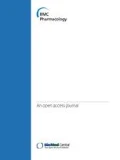Background
Ibogaine is an alkaloid derived from the African shrub Tabernanthe iboga. Psychoactive properties of ibogaine have been known for decades, but more recently the drug has received much attention because of its promising “anti-addictive” actions. Thus, ibogaine and its derivatives are being studied as potential treatment for opioid and stimulant abuse, as well as for alcoholism and smoking. Because ibogaine has a complex pharmacology and is known to interact with numerous different cellular targets, its potential to generate adverse effects is significant. Besides the expected neurotoxic actions, ibogaine may e.g. also affect the heart. Thus, several cases of sudden death after ibogaine use were reported, which have been hypothesised to be related to cardiac arrhythmias. In accordance, a severely prolonged QT interval of the electrocardiogram and ventricular tachyarrhythmias were observed in a woman after she had taken ibogaine.
Methods
To study possible mechanisms by which ibogaine may trigger cardiac arrhythmias, we explored ibogaine’s effects on the function of cardiac voltage-gated ion channels, by using the whole-cell patch-clamp technique. In addition, we also tested the ibogaine derivative 18-methoxycoronaridine (18-MC), which is considered less toxic.
Results
We found that currents through human ERG (hERG) potassium channels, heterologously expressed in tsA201 cells, were inhibited by ibogaine in low micromolar concentrations (IC50: 3 µM). In addition, ibogaine significantly altered the hERG channel gating properties. The IC50 of hERG current inhibition by 18-MC was 15 µM. Heterologously expressed human NaV1.5 sodium channels were also affected by ibogaine. For sodium current inhibition about 25-fold higher ibogaine concentrations were needed than for hERG. Finally, experiments on isolated adult mouse cardiomyocytes showed that ibogaine also affects currents through voltage-gated ion channels in their native environment.
Conclusions
Because the ibogaine concentrations in animal and human plasma after ibogaine uptake reach low micromolar concentrations which impair the function of cardiac ion channels, the drug must be considered a potential cardiac arrhythmia risk.
Acknowledgements
Supported by the Austrian Science Fund FWF (P19352 and P23060 to K.H.).
Author information
Authors and Affiliations
Corresponding author
Rights and permissions
Open Access This article is published under license to BioMed Central Ltd. This is an Open Access article is distributed under the terms of the Creative Commons Attribution License ( https://creativecommons.org/licenses/by/2.0 ), which permits unrestricted use, distribution, and reproduction in any medium, provided the original work is properly cited.
About this article
Cite this article
Kovar, M., Koenig, X., Mike, Á. et al. The anti-addictive drug ibogaine modulates voltage-gated ion channels and may trigger cardiac arrhythmias. BMC Pharmacol 11 (Suppl 2), A1 (2011). https://doi.org/10.1186/1471-2210-11-S2-A1
Published:
DOI: https://doi.org/10.1186/1471-2210-11-S2-A1

